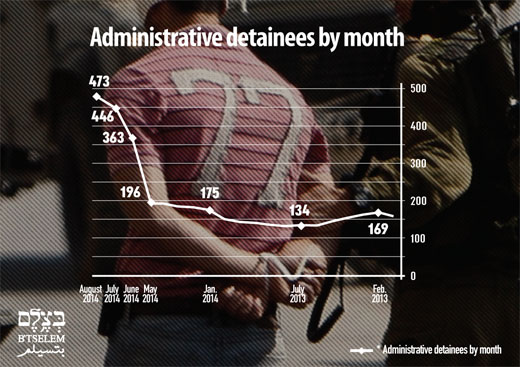Almost six months ago, in May 2014, B’Tselem cautioned that the number of Palestinians held by Israel in administrative detention was rising. In June and July 2014, over the course of Operation Brother’s Keeper, the military issued some 250 new administrative detention orders; at the end of August 2014, Israel was holding some 473 detainees in administrative detention – the highest number since April 2009. Within one year, the number of detainees had more than tripled.
According to Israel Prison Service (IPS) data, more than 60 percent of administrative detainees held at the end of August 2014 had been held for three months or less. Some 10 percent had been held for three to six months, some 13 percent from six months to one year, and some 13 percent from one to two years. Four detainees had been in administrative detention continuously for over two years.
Administrative detention is detention without trial, ostensibly intended to prevent people from committing acts that are liable to endanger public safety, rather than punishing them for offenses already committed, as is the case in criminal proceedings. As detention on the basis of potential conduct rather than past actions is problematic, international law permits its use only in the most exigent circumstances.
However, the Israeli security establishment uses administrative detention on a mass scale, in defiance of these restrictions. At no stage are the detainees told the reason for their detention or the specific allegations against them, nor do they know when they will be released: although each administrative detention order may not exceed six months, it can be renewed indefinitely.
Although detainees are brought before a judge to approve the detention order, the judicial review is merely a semblance of a just legal system: most of the material submitted by the prosecution is classified and not disclosed to the detainees or their counsel . Since the detainees do not know evidence there is against them, they are unable to refute it. Given the inherently inferior position of detainees in such proceedings, military judges and High Court justices presiding over these cases have a duty to serve as “temporary defense counsel” for the detainees, but they often shirk this responsibility and almost always accept the position of the security establishment.
Relying on the secrecy of the process, and with court approval , the security establishment illegally exploits administrative detention to incarcerate people for offenses allegedly committed in the past so as not to expose evidence against them.
Over the years, Israel has held thousands of Palestinians in administrative detention for periods ranging from a few months to several years. A number of Israeli citizens, including settlers, have also been held in administrative detention for periods of a few months. There were times during the second intifada when Israel held over a thousand Palestinians in administrative detention.
Some 70 percent of the administrative detainees held at the end of August 2014 were held in facilities located inside Israel – a violation of international law, which entails further violation of their rights, including denying some of them the right to visits, as the security establishment refuses to issue relatives permits to enter Israel.
The government of Israel must release all administrative detainees or prosecute them, in accordance with due process.

 العربية
العربية עברית
עברית Türkiye
Türkiye Русский
Русский Français
Français We Watch Israeli Violations Specialized website in monitoring and documenting Israeli violations against Palestinians
We Watch Israeli Violations Specialized website in monitoring and documenting Israeli violations against Palestinians






